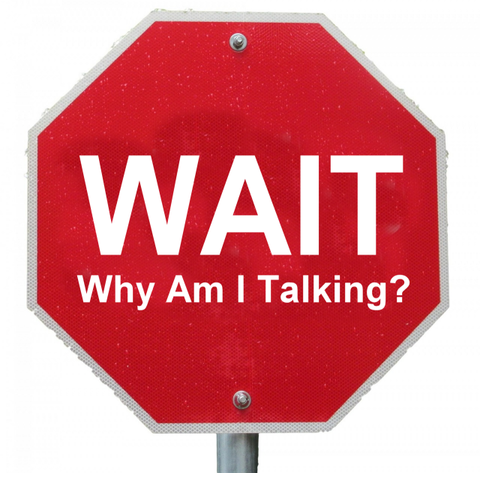|
|
|
|
|
|
|
|
Most people think
they are
good listeners.
Even if they are not.
|
|
|
|
Why Am I Talking?
Asked
if they believe they are good listeners, most people answer, “Yes.”
Ironically, many of those individuals may go on and on, telling you
about what great listeners they are!
The first step in becoming a Catalytic Listener will seem obvious, but here goes: Stop Talking.
|
|
|
|
|  |
With Catalytic Thinking’s emphasis on the power of language, we tend to eschew acronyms. WAIT, however, is one that makes us smile.
WAIT = Why Am I Talking?
WAIT is a great reminder, and a great exercise.
Post a sign where you can see it, with the word WAIT in plain sight. If it’s helpful, add the words “Why am I talking?”
Or just print out this page, and cut out the graphic. Remind
yourself several times during the day that when the situation arises,
you will pause before talking – you will WAIT.
And you will listen. Nod, smile, provide comfort or appreciation in your body language. And just listen.
Breathe
in what you are hearing. What does it sound like that other person is
feeling? Why is what they are sharing important to them?
If you want to begin stepping into more Catalytic Listening, when it is your turn to talk, ask them to tell you more about whatever it is they were sharing. “Tell me more about that” is an invitation, a huge part of being a Catalytic Listener. Then listen to their answer. Without talking.
You
may be surprised at what you learn in this exercise. It may be what you
learn from that other person. Or it may be about yourself. Don’t
be surprised if what you learn includes, “Wow, I thought I was
listening, but I talk more than I thought.”
If that is you, relax – we all talk more than we think we do! That is why a full 1/3 of the Catalytic Thinking framework is devoted to Catalytic Listening.
So this week, WAIT. And as you notice what happens as a result of that simple step, let us all know what you find! |
| |
|
|
Want to learn alongside other people who are trying out these practices? Join us at the Catalytic Thinking in Action community on Facebook -
a welcoming place where you can ask questions and learn from people
like you who are experimenting with these practices. We look forward to
seeing you there!
|
|
|
|
eJournal Archives:
If you’re new to our eJournal, or just want to remind yourself of past practice exercises we’ve shared, check out our eJournal archives here.
|
|
|
|
|
|
|
|
|
|
|
|
|
|
Keeping Our Programs Freely Available Most of the programs at Creating the Future are free or low cost, with liberal tuition assistance when they aren’t.
|
| If you find our programs of benefit, we hope you will consider contributing, to help keep these programs available to as many |
|
|
|
|
Creating
the
Future
is a
collection of
people around
the world,
supporting
each other in
a grand
experiment.
|
|
|
|
|
The
experiment:
To
determine how
much better
the world
could be if
the questions
we ask in our
day to day
lives are
bringing out
the best in
each other.
If
everyone,
everywhere, is
bringing out
the best in
every person
they encounter
– and if the
systems that
guide our
behaviors are
built to bring
out the best
in all of us -
how much
closer will we
all be to a
healthy,
humane world
that works for
all of us?
|
|
|
|
|
|
|
|
|
|
|
|
|
|
|
|